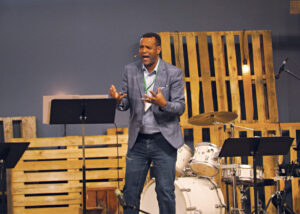I am always interested in the impact of culture on faith, and vice versa. Western culture places a high value on personal agency, the ability to make individual decisions that impact one’s future. Other cultures understand that there are many forces beyond one’s control that limit autonomy, such as extended family needs or unjust political and economic contexts. Of course, both are true.
In a context of faith, some cultures place more emphasis on individual action, while others put more emphasis on God in control. I have a couple of examples about differences in how people react to situations beyond their control.
I’ve been testing positive for COVID-19 for the last two-and-a-half weeks, resulting in many missed commitments, some of them very hard for me to miss. My international colleagues have been “praying for a miracle,” while a friend in my local congregation writes, “May your God-given recovery processes benefit you quickly.”
One of the meetings that I may miss is the Mennonite World Conference annual board and staff gathering, held this year in British Columbia.
But I would not be the only one missing it due to events beyond my control. A number of international participants have not received their visas. Again, there has been much prayer, because “anything is possible with God.” There was also much hard work behind the scenes to try to get help from Ottawa connections.
And yet it appears that more than a handful of people will not be able to come to Canada. I am amazed at their level of acceptance.” “It is the reality of the moment, we have to accept it.”
My husband Keith taught adults in the Middle East. He likes to use “Insha’Allah”—Arabic for “if God wills”—when it is clear that circumstances are beyond our control. It is easier for him to use the Arabic phrase than to say it in English, which says something about the worldview that works in Arabic.
It is a well-known phrase, a commandment from the Qur’an, to be used when talking about future hopes, plans and promises. If used well, it implies that the person will do their utmost to bring forth those plans, and it is in God’s hands.
I heard some friends report that “God willing” used to be a common expression in older times in Canada. It is not a phrase that I grew up with, at home or at church. My Baptist upbringing had an intriguing balance of emphasis on individual responsibility, while God is in complete control of everything.
Living outside of North America in my younger adult years, I learned about different worldviews. I learned to pray kneeling beside others, “Give us this day our daily bread,” knowing that daily food was not to be taken for granted. I learned that the Sesotho language has a word for a body part that doesn’t heal properly after an injury. English doesn’t name that. I experienced a worldview and a faith based on much more hardship than my life experience gave me, leading to dependence on God, because individual agency is not enough.
In Canada, many of us have more than enough to meet our basic needs. We rarely confront the limits of our abilities on a daily basis, until illness or another unpredictable factors get in the way. Our western worldview too often turns to God only after individual agency fails. I continue to learn from churches in other parts of the world that dependence on God is a daily part of faith, just like I learned in my childhood.
Arli Klassen is a staff member of Mennonite World Conference, living in Kitchener, Ont., and reachable at klassenarli@gmail.com.
Read more The Church Here and There columns:
Belonging comes first
The wider church and church budgets
On boycotting church
Indonesian peacemaking
50 years of change









Leave a Reply
You must be logged in to post a comment.